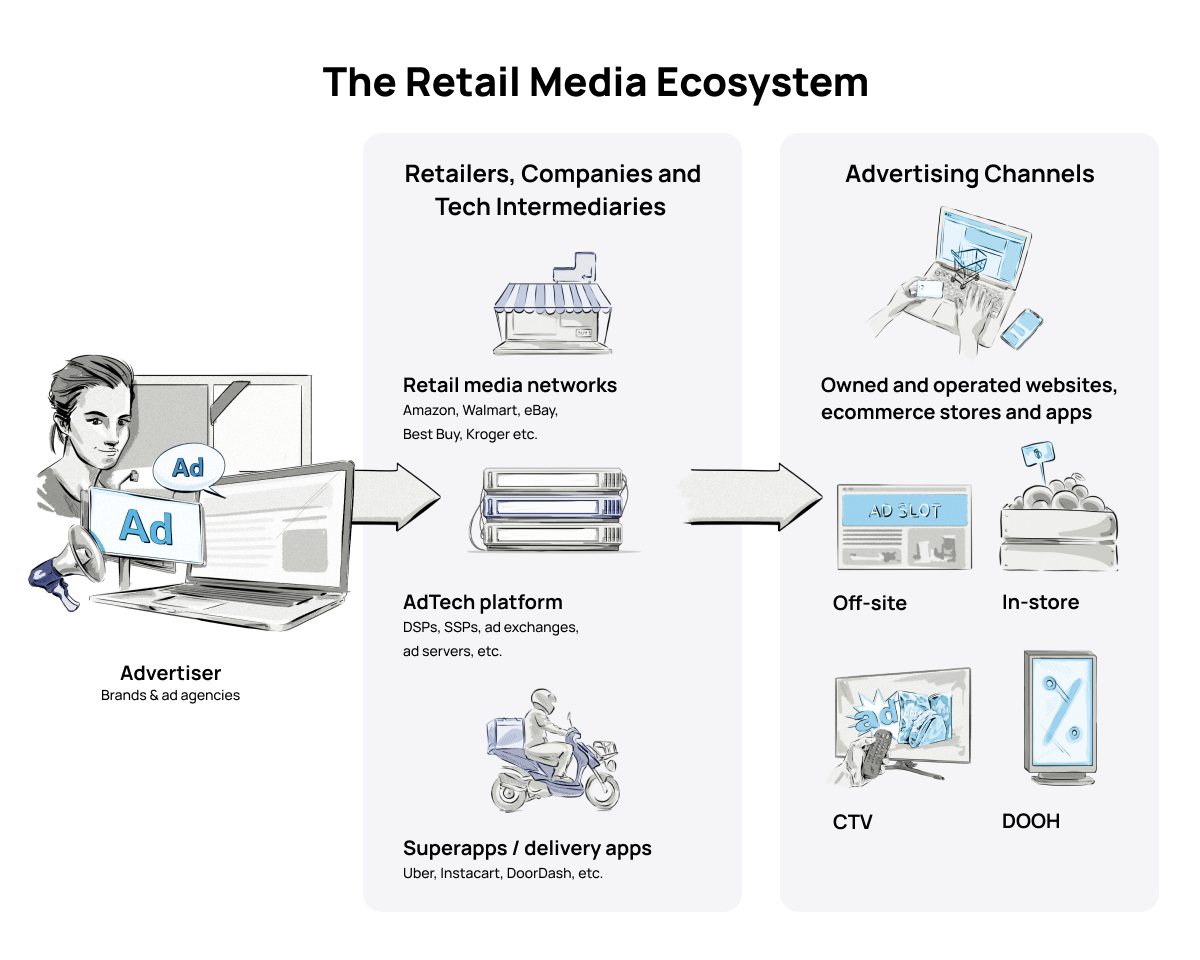As the world continues to embrace the convenience and excitement of online shopping, the e-commerce market has soared to unprecedented heights, causing a remarkable shift that’s transforming how businesses reach their potential customers and interact with their existing ones. This transformation is especially visible in the captivating realm of retail media.
With a staggering $45 billion US retail media market, retailers are attempting to seize the golden opportunity that retail media presents to not only cater to evolving consumer preferences, but also open up new avenues for advertisers seeking to engage with their most coveted audiences.
In this blog post, you will learn about the opportunities for retailers and advertisers in the retail media space, as well as the challenges related to using AdTech within the retail landscape.
Key Points
- Retail media networks (RMNs) are capturing a growing portion of marketing budgets as manufacturers and brands redirect their expenditures to focus on engaging consumers in proximity to the point of purchase.
- The end of third-party cookies in web browsers and the focus on using first-party data for advertising is a key force that’s driving interest in retail media.
- Between 2024 and 2027, retail media is expected to be the fastest-growing advertising channel.
- The main benefits of retail media for advertisers are closer relationships with their consumers, more accurate targeting, and closed-loop attribution.
- The main benefits of retail media for retailers are the ability to unlock and monetize their first-party data, improve inventory management and sales, and boost company revenue.
- The main challenge for retailers when building a retail media network is finding a software development partner that has experience in AdTech development.
The Rise of Retail Media
While both retail and retail media share the common goal of driving sales and enhancing the customer experience, they operate on distinct fronts within the retail ecosystem, so it’s crucial to differentiate them.
Retail, in its classic form, encompasses the brick-and-mortar stores and e-commerce platforms where products and services are sold directly to customers.
Retail media, on the other hand, is a relatively new phenomenon that has roots in traditional retail advertising but has evolved to adapt to the digital age; it represents a convergence of commerce and advertising within the retail space.
There are various reasons for retail media’s rise in popularity among advertisers and retailers, one of which is the desire to reach consumers just as they’re about to buy a product.
The end of third-party cookies in web browsers and the focus on using first-party data for advertising is another key force that’s driving interest in retail media.
Yet another key aspect is the fact that the demand for shopper convenience has become one of the top priorities, accelerated even more by the transformative impacts of the pandemic and continuous technological advancements.
This leaves retailers with no choice but to accommodate consumers’ needs by improving the overall shopper experience, whether it’s through a smoother shopping process or by providing personalized but non-intrusive ads.
Moreover, in a recent survey by Prosper Insights & Analytics, around 19% of consumers expressed a preference for the convenience of purchasing online and utilizing in-store pick-up services, while 18% used grocery delivery apps, and 16% made regular online purchases for home delivery, making it crucial for retailers to boost their social media presence either through paid advertising or social media marketing, which will simultaneously generate traffic in their physical stores.
It’s also worth mentioning that from 2024 onwards, and at least until 2027, retail media is expected to undergo an exceptional upswing, meaning that establishing a fresh retail media partnership model that brings retailers, advertisers, and AdTech together will be crucial.

The Benefits of Retail Media for Advertisers and Retailers
As the digital advertising landscape continues to evolve, retail media is poised to play a pivotal role in the success of both advertisers and retailers, as it represents a win-win situation for both groups.
In short, advertisers can gain access to highly targeted audiences, improve their ROI, and obtain valuable insights, while retailers can enjoy a new revenue stream, enhanced customer experiences, and a competitive edge in the market.
However, let’s explore a bit further to see what advertisers and retailers can actually gain by including retail media as part of their business strategy.
For Advertisers
Being Closer to Consumers
In order to reach consumers right on the verge of purchasing the product, manufacturers and brands are increasingly redirecting their investments, mainly into RMNs.
According to research done by McKinsey, 73% of advertisers expect to boost their spending on RMNs in the next 12 months, and RMNs are anticipated to account for roughly 10-15% of the complete media expenditure.
Targeting Shoppers Accurately
RMNs employ sophisticated data analytics to identify and reach ideal shoppers. By tapping into first-party shopper data, advertisers can gain invaluable insights into consumer preferences, behaviors, and needs, ensuring that customers are exposed to products that genuinely resonate with their interests.
Implementing Closed-Loop Attribution
With ad impressions and sales occurring within the same platform, advertisers can precisely monitor the effectiveness of their advertisements and, therefore, readily demonstrate that their marketing efforts are delivering tangible results.
Thanks to closed-loop attribution, the influential marketing channels are automatically credited, making it easier for advertisers to understand the customer journey and to determine which of their ads contributed to a conversion.
We Can Help You Build a Retail Media Network (RMN)
Our AdTech development teams can work with you to design, build, and maintain a custom-built retail media network (RMN) for any programmatic advertising channel.
For Retailers
Unlocking First-Party Data
In the world of retail media, Amazon and Walmart significantly dominate the industry due to their large amounts of first-party consumer data.
However, across the entire retail media ecosystem, numerous independent AdTech companies exist to help retailers unlock the value of their first-party data to power audience targeting, measurement, and attribution.
Improving Inventory Management and Sales
AdTech can help with better inventory management since it can provide product information and highlight product availability at specific stores.
This can help retailers promote the products they have in stock and avoid promoting those products that are out of stock, leading to better inventory management and an increase in sales.
Boosting Revenue
It’s not always possible for retailers to increase the margins on their products, but by building an advertising business, they can create a new revenue stream.
By establishing an advertising business that’s centered around their first-party customer data, retailers can create a new revenue stream that will allow them to offset revenue from low-margin or fixed-margin products sales.
The Main Challenges Retailers Face When Building a Retail Media Network (RMN)
Despite the rise in popularity and investment, the retail media industry is facing growing pains. While most of these issues are business related, some are connected with the technological side of building and running a retail media network.
Balancing Ambition with Pragmatism
While the potential for any retailer with a receptive audience to establish an RMN exists in theory, the practical execution of such networks demands a substantial investment of both time and financial resources.
As marketers venture into the world of retail media, they are confronted with the intricate challenge of managing media purchases across numerous networks. The endeavor, although promising in terms of reach, often proves to be costly and time-intensive.
Retailers that decide to go down the build-it-yourself path quickly realize that developing an AdTech platform to power their retail media business is not an easy task, even for seasoned developers.
Without support and input from an experienced AdTech development partner, retailers will likely experience delays in launching their retail media network.
Navigating Uncharted Territories
Even with the potential of closed-loop attribution, the absence of standardized measurement practices is a prevalent concern, making it difficult for advertisers to measure ad campaigns.
This lack of universally accepted metrics and methodologies also hinders effective assessment and comparison across campaigns and platforms.
It’s a challenge that retailers face when building a retail media network, but that’s not to say that it can’t be achieved with the right technology and first-party data strategy.
Also, it’s likely that industry bodies like the IAB will introduce measurement standards for retail media in the future, just as has been done for other digital advertising channels.
Shifting From Expansion to Consolidation
As the retail sector witnesses a gold rush of retailers vying to establish their RMNs, the industry will soon find itself with a fragmented landscape that includes hundreds of RMNs for brands to choose from.
Smaller retailers at the fringes of this expansion may face a natural process of consolidation and be acquired by larger players.
For retailers, the influx of competitors necessitates a strategic approach that encompasses innovation, value proposition differentiation, and a keen awareness of the evolving market dynamics.
For this reason, it’s vital that retailers get the technology part right — both the internal and external integrations, as well as the technical consultancy and development aspects — when building their RMNs.
Doing so will help them to fully utilize their first-party data.
Maintaining Exclusivity and Attraction
The allure of cultivating a walled garden approach, while fostering exclusivity, comes with the inherent risk of alienating potential advertisers.
Striking a balance between creating an enticing environment for advertisers and upholding the principle of openness is an ongoing challenge for RMNs, but it can be achieved with the right business strategy and development partner.
We Can Help You Build a Retail Media Network (RMN)
Our AdTech development teams can work with you to design, build, and maintain a custom-built retail media network (RMN) for any programmatic advertising channel.







